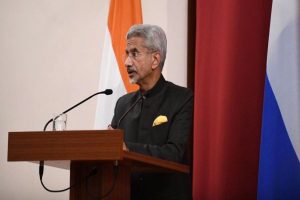Prime Minister Narendra Modi on Tuesday chaired the first meeting of the newly-formed Anusandhan National Research Foundation (ANRF) and said there is a need to identify and remove obstacles in the research ecosystem in the country.
He said the day marked a new beginning in the field of scientific research in the country.
“Research should focus on finding new solutions to existing problems. Problems might be global in nature but their solutions must be localized in accordance with Indian needs,” he said.
Mr Modi said there is a need to set high targets, focusing on them and doing path-breaking research. He discussed the need for upgradation and standardisation of institutions and suggested preparing a list of domain experts on the basis of their expertise.
The ANRF has been set up as an apex body to provide high-level strategic direction to scientific research in the country as per recommendations of the National Education Policy.
The Prime Minister stressed on the need for scientific monitoring of utilisation of resources for research and innovation. Saying that this is an ambitious beginning, he said the scientific community of the country should have faith that there will be no dearth of resources for their endeavours.
He told the meeting discussing India’s Science and Technology landscape and redesigning of research and development programmes, that a dashboard can be developed where information related to research and developments happening in the country can be easily tracked.
Discussing the positive impact of Atal Tinkering Labs, the Prime Minister said grading of these labs can be done. He suggested research in various areas, like looking for new solutions to environment change, battery ingredients for EVs, lab grown diamonds, among others.
During the meeting, the Governing Body decided to launch a programme in hub and spoke mode by pairing universities where research is at nascent stage with top tier established institutions in mentorship mode.
The Governing Body discussed several areas of strategic interventions of ANRF which include global positioning of India in key sectors, aligning R&D with national priorities, promoting inclusive growth, capacity building, driving scientific advances and innovation ecosystem, as well as bridging the gap between academic research and industrial applications through industry-aligned translational research.
The ANRF will launch programmes on solution-focussed research in mission mode in select priority areas like Electric Vehicle (EV) mobility, Advanced Materials, Solar Cells, Smart Infrastructure, Health & Medical Technology, Sustainable Agriculture and Photonics. The Governing Body observed that these efforts would supplement the march towards Atmanirbhar Bharat.
Underscoring the translational research with active participation from the industry, the Governing Body emphasized on promoting fundamental research for advancement of knowledge.
It was decided to set up Centers of Excellence to support interdisciplinary research in humanities and social sciences. It was agreed that there was a need to empower the researchers with flexible and transparent funding mechanisms towards achieving ease of doing research.
The Governing Body directed that the ANRF strategies should align with the goals of Viksit Bharat 2047 and implementation should follow global best practices adopted by research and development agencies across the world.
The ANRF will promote research and development and foster a culture of research and innovation throughout India’s Universities, Colleges, Research Institutions, and R&D laboratories.
The meeting was attended by Education Minister Dharmendra Pradhan as the Vice-President of Governing Body; the Principal Scientific Adviser to the Government of India as Member Secretary; Member (Science), Niti Aayog and Secretaries of the Department of Science & Technology, Department of Biotechnology, Department of Scientific & Industrial Research and Department of Higher Education, as ex-officio members.
Other prominent participants included Prof Manjul Bhargava (Princeton University, USA), Dr Romesh T Wadhwani (Symphony Technology Group, USA), Prof Subra Suresh (Brown University, USA), Dr Raghuvendra Tanwar (Indian Council of Historical Research), Prof Jayaram N. Chengalur (Tata Institute of Fundamental Research) and Prof G Rangarajan (Indian Institute of Science).












